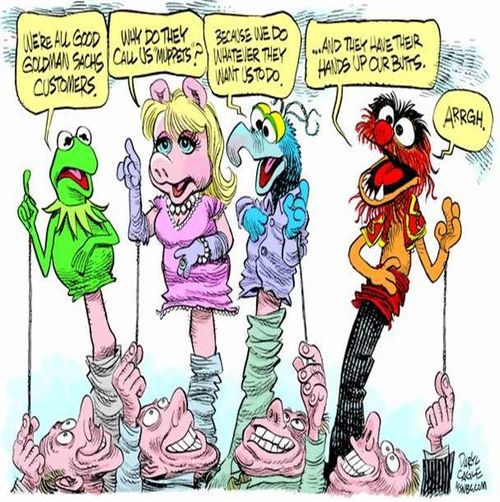
Another day another conference, this one was about “Fixing
our banks – what to fix for whom?” at South Bank University.
There was a decent turnout of students and academics, and a
panel providing a multidisciplinary view from auditors, customers, shareholders
and employees perspectives, along with my own.
I opened the proceedings and said something like the following:
“So, we need to fix our banks according to the title of this
meeting, but why? That implies there’s
something wrong with our banks and so, before I go any further, I need to know
what you think.
Who here thinks that banks are morally bankrupt parasites on
society?
The majority of the
audience raised their hands.
And who here would like to be a banker?
Two raised their hands
tentatively.
Well you should want to be bankers, I said, as they can make
a lot of money and not give two hoots about society, according to the media.
By coincidence, this is the front page of today's Evening Standard for example.

But that’s only a headline because the average journalist
earns just £25k a year and is incredibly jealous of anyone who gets a million
pound bonus.
So what’s the truth?
Well there are problems in banking.
As Jamie Dimon, CEO of JPMorgan, said when his daughter asked
him: what’s a banking crisis, to
which he replied: something that happens
every seven years.
And, sure enough, time and time again we do have banking
crises.
Just that the seven year cycle is normally a crisis that is
a minor implosion rather than a major explosion. Rather than a volcano eruption, they’re just
pin pricks. They hurt those affected,
but not everyone.
The last crises hurt everyone.
That’s because people were selling things they didn’t
understand and shouldn’t have been trading: derivatives, derivatives squared, derivatives
to the power of n, derivatives backed by thin air.
That was the issue.
The issue is illustrated well by Lehman Brothers.
Lehman’s collapsed on September 14th 2008 with
$400 billion of debt on their books.
$400 billion?
That doesn’t sound so bad these days does it.
It’s less than the UK has spent on Quantitative Easing.
It’s a fair bit, but not that much in scheme of things.
But the problem was the for every dollar of debt on Lehman’s
balance sheet, there was $20 of debt being traded through the OTC derivatives
market.
Lehman’s AAA credit rating was the backing for many collateralised
debt obligations (CDOs) and other tradable instruments.
In other words, the $400 billion of debt was leveraged
twenty times over in the global markets to represent $8 trillion of risk.
That is why the rug was pulled from under the markets on September
14th 2008 and why so many
banks that were leveraged in the securitised debt markets found themselves struggling:
Wachovia, Washington Mutual, RBS, HBOS, Fortis, Commerzbank and more all
shuddered in that week.
That was when we realised that we had systemically important
financial institutions (SI-FIs) that were too big to fail.
Since then we thought it could not get any worse but, just
as we think that, it gets worse.
Kweku Adoboli, Jerome Kerviel and the London Whale.
Money laundering and rate fixing.
Insurance mis-selling and treating customers like muppets.

Every day we wake up hoping it won’t get worse … and then it
does.
Just today it’s back to bankers bonuses and a lack of
lending to small businesses.
Every day it gets worse.
But it will get better.
It will get better because the government is making it
better.
The Vickers Report with its ring fencing of bank operations
will make banks better and more resilient to global markets.
The European Regulations for limits on bank bonuses will make
banks and bankers behave better and more responsibly.
And the G20 agreements on Basel III capital reserves will
avoid bank failures due to a lack of capital.
But regulations do not fix the banks.
Regulations purely trail market failures and try to sweep up
the mess.
No, what will fix the banks is a change of behaviours.
A change of mentality.
A change of culture.
That’s what is really needed here and that is coming.
It is illustrated well by fundamental shifts in bank
thinking demonstrated by banks such as Barclays who, along with laying off many
of their investment bank divisions and announcing a change of culture in their
bank operations, have cemented that change of culture by withdrawing from the food commodity markets.
These markets made them $400 million in profits in 2012, and
they’ve thrown that away?
Why?
Because food commodity speculation has driven up the cost of
food for the poor of the world and the bank recognises that this behaviour is wrong.
They don’t just recognise this misbehaviour now, but they ACT.
The change of culture is also demonstrated by the Royal Bank
of Scotland, RBS.
RBS is the incredibly shrinking bank.
They have cut their assets from £1.6 trillion at the height
of the crisis to almost half that today.
They have sold key assets including Direct Line, their
Aviation business, WorldPay and more is to come from the sale of Citizens and branches.
They are a shadow of their former self and are back to being
a boring old UK bank.
That’s what we want them to be, and that’s what they are becoming
again.
In other words, the speculative banks of the last decade are
becoming boring banks today.
That’s how fixing the banks will bring back trust in banking.
But can banking ever be trusted again?
Will banks behave badly again, as soon this crisis is ended?
Maybe.
Maybe tomorrow.
That’s why it is important to listen to our stakeholders and
that’s what we will do now: listen to the stakeholders.
I am delighted to introduce our distinguished panel.
Providing a bank's perspective is Charles Middleton,
Managing Director of Triodos Bank;
Giving us the Board of Directors and Shareholder’s view is
Seamus Gillen, Policy Director with the Institute of Chartered Secretaries and
Administrators (ICSA);
For the employee’s view we have Dominic Hook, National
Officer for Finance and Legal with the Unite union;
The customer’s view from James Daley, Head of Money Content
with the Which? Consumer’s Association; and
Professor Andrew Chambers will provide the auditors view.
I shall summarise their views tomorrow, and it proved
interesting.
We have a repeat evening of this debate at the Financial Services Club on 14th May with:
- Charles Middleton, Managing Director of Triodos Bank;
- Dominic Hook, National Officer for Finance and Legal with the Unite union; and
- James Daley, Head of Money Content with the Which? Consumer’s Association
If you would like to attend, click here.
This was part two in a five part series:
- Fixing Our Banks: Part One
- Fixing Our Banks: Part Two - the Bank View
- Fixing Our Banks: Part Three - the Shareholder's View
- Fixing Our Banks: Part Four - the Employee's View
- Fixing Our Banks: Part Five - the Customer's View
Chris M Skinner
Chris Skinner is best known as an independent commentator on the financial markets through his blog, TheFinanser.com, as author of the bestselling book Digital Bank, and Chair of the European networking forum the Financial Services Club. He has been voted one of the most influential people in banking by The Financial Brand (as well as one of the best blogs), a FinTech Titan (Next Bank), one of the Fintech Leaders you need to follow (City AM, Deluxe and Jax Finance), as well as one of the Top 40 most influential people in financial technology by the Wall Street Journal's Financial News. To learn more click here...

